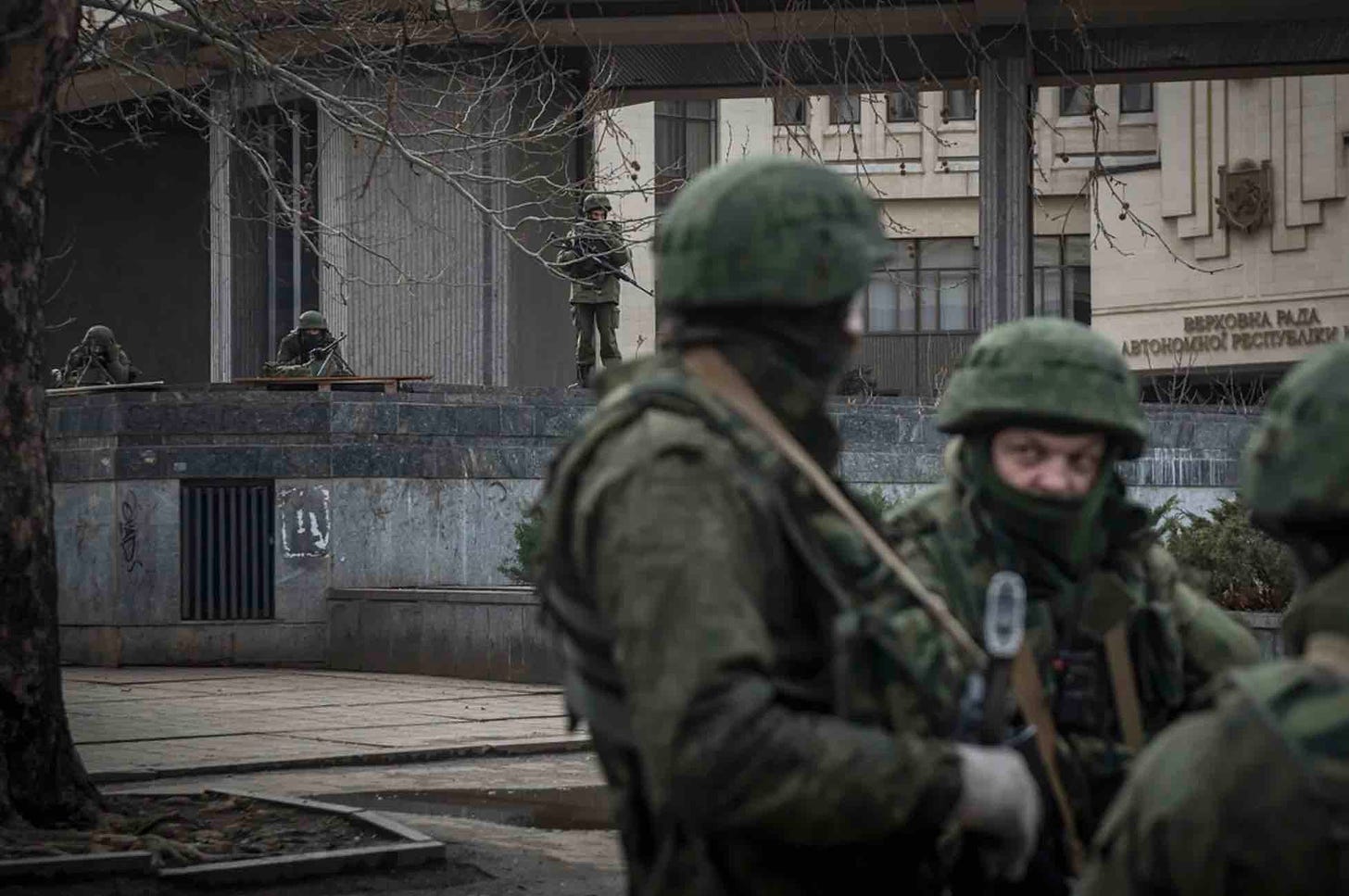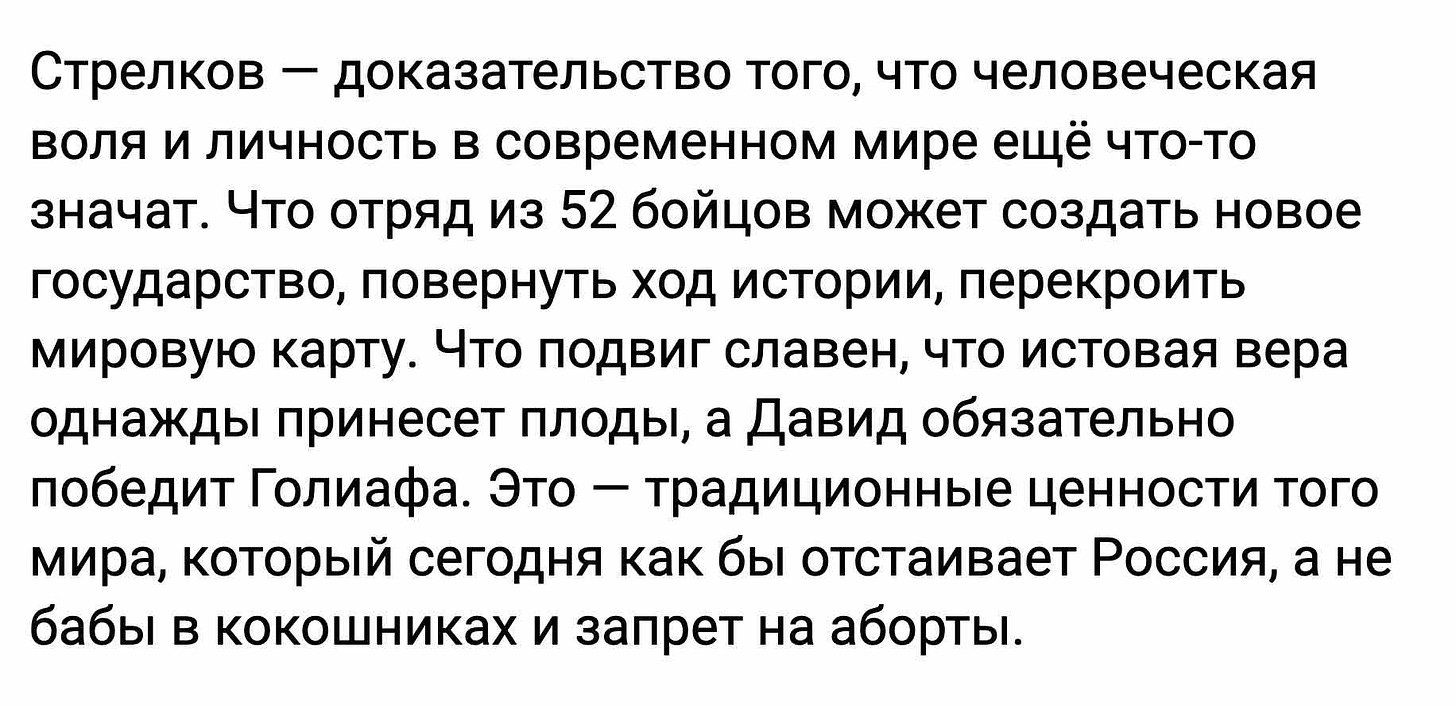How the Minsk agreements died on arrival
Negotiating with terrorists is not just morally wrong, it's futile
What were the Minsk agreements actually? If you believe the pro-Russian Western accounts, somehow mystically they were BOTH a good peace treaty, unilaterally rejected by Ukraine, and at the same time, a cunning deceit from the West intended to arm Ukraine. I really wonder how people who believe in BOTH these versions imagine them.
First: there is no need to imagine. The Minsk agreements have a nice Wikipedia entry.
Of course, one might not trust Wikipedia. After all, it is nothing but an instrument of the satano-masonic conspiracy aiming to fed us with insects while they poison us with vaccines for a lab-made disease.
But if you don’t trust it, you can check a direct link to the original. Here it is!
via Aaron Mate Twitter account
People like Aaron Mate (quoted above) are too lazy to check. And they correctly assume their audience is also too lazy to check.
Once again I emphasize the expression “pro-Russian Western”, because you won’t find it in the actual Russian propaganda. “Aaron Mate style” propaganda works only for the people who only recently learned of the existence of Ukraine.
I don’t blame them. Until very recently, I didn’t know about the existence of ECOWAS. I’m not proud of my ignorance, but at least I don’t pontificate on how African countries should redraw their borders to my liking. That alone makes me a better person than Aaron Mate.
“Little Green Men” occupying the parliament building in Crimea, 1.03.2014, photo by Sergey Ponomarev, taken from: “The little green men A look at the people behind the annexation of Crimea. A photo series by Sergey Ponomarev”, Meduza.io, 11.03.2015, link below
In order to understand the Minsk agreements, first you have to remember that in 2014 Ukraine was invaded by Russian-sponsored paramilitaries led by Moscow resident Igor Girkin. At the time, Russia vehemently denied its involvement, claiming that these paramilitaries came from some unknown location, perhaps even a different planet, hence their nickname - “Little Green Men”.
Today this is no longer denied by anyone in Russia. Girkin is now in prison, but not for his war crimes - he just went too far in criticising Putin.
His Telegram channel is now run by his wife, who is reposting some scarce voices in defence of Girkin. The one quoted below is a heartwarming story of a brave leader who changed the course of history with a group of “52 warriors”.
“He’s a proof … that a detachment of 52 warriors can create a new country, change the course of history, re-draw the world map” - a very poetic praise of Girkin by one of his followers, taken from his Telegram account
Let me reiterate. Nobody in Russia currently denies the role Girkin played in the invasions on Crimea and Donbas in 2014. His friends praise him for how much he managed to achieve given so little resources, his enemies chastise him for failing to capture the entire Donbas.
The fairy tale of “pro-Russian population of Crimea and Donbas who revolted against the CIA-installed junta” does not exist in the Russian media sphere. Only the people in the West who are as clueless about Ukraine as I am about Africa, still fall for it.
But Russia was still in full denial back in 2014, which turned the peace negotiations into a farce. Russia presented itself as a neutral, non-belligerent party, as much concerned with the “insurgency” in the neighbouring country as anybody else.
The Western leaders of the time (notably Francois Hollande and Angela Merkel) pretended they believed this. It was the peak of the “do not anger the bear” period.
The Russian-appointed “leaders” of the “separatist republics” declared they don’t care about peace negotiations, since they were not invited. However, not even Russia was willing to recognise them (they did so only on the eve of the 2022 invasion), so inviting them to the table would break a long standing taboo on “negotiating with terrorists”.
Donetsk People Republic spokesperson Eduard Basurin rejecting Minsk 1 - taken from “Ukraine suffers considerable losses”, TASS agency, 23.01.2015
This is what they were, both in legal and practical terms. They grabbed power in Donbas and Crimea by abducting and killing people. They even held the OSCE observers as hostages.
The Minsk negotiations were doomed to fail. The first round (Minsk 1) was ignored by the “separatists”.
They whole point of the negotiations was brokering a ceasefire. The separatists used it as a cover for another offensive. Hence Minsk 2 - where they were invited without diplomatic recognition.
Negotiating with terrorists is not just morally wrong, it is an exercise in futility. If they are not shy of killing innocent people, how do you expect them to be shy of lying?
It should be no surprise to anyone (except, of course, Merkel & Hollande) that the separatists ignored the ceasefire almost immediately after signing the agreements. Thus, Minsk 2 was dead on arrival much like its predecessor.
An obituary for the ceasefire - taken from “Ukraine Truce Hangs by Thread as Rebels Claim Key Rail Hub” by David Stout, Time Magazine
I wonder how Aaron Mate imagines himself “honuring of Minsk” from Ukraine. How can you honour a ceasefire unilaterally? Be shot without shooting back? I guess that’s what he wants, because for the next 8 years, shooting back in counterbattery fire was presented by these guys as the “Donbas genocide”.
Since the main point of Minsk 1 and Minsk 2 - ceasefire - was unilaterally rejected by the “separatists”, it makes little relevance what else was in the agreements. Yes, it’s true they included concessions providing larger autonomy to the Donbas provinces, but on conditions of restoring law & order in the area.
In practice this meant returning border controls to the Ukrainian border guards (for some mysterious reason, the “separatists” who came from unknown country, started with capturing Russo-Ukrainians border checkpoints), allowing OSCE inspectors to monitor the implementation of the agreement, run early elections according to Ukrainian law under international monitoring and withdrawal of the “Little Green Men” to their mysterious planet of origin.
Since the separatists did not even pretend they intended to implement any of these - it’s hard to imagine what Ukraine could have done to unilaterally implement their part of the agreements.
What was the point, then? Was it worth it?
The Girkin-led invasion was a humanitarian disaster. The frontline went through many settlements, trapping thousands of people without food, water, heating or electricity. Even an imperfect ceasefire was a chance to save some lives.
On the international level, the biggest fear back then was that Putin will quit the “Little Green Men” charade and switch to a full scale invasion. Ukraine was not ready for this, nor was the West.
But was Putin ready? As with alternative histories, we’ll never know “what if”.
By invading Ukraine, he violated a lot of international treaties. Not just the toothless “Budapest Memorandum”, but the UN Charter, OSCE Treaty and whatnot. For 8 years the leaders of the West were turning a blind eye on this, pretending the “Little Green Men” came from outer space.
Taken from: Angela Merkel opens up on Ukraine, Putin and her legacy” by Alistair Walsh, Rina Goldenberg; “Deutsche Welle, 06.07.2022
Angela Merkel is saying today that these 8 years helped Ukraine to arm itself. Well, not thanks to her, that’s for sicher. Germany was always in fear of “angering the bear”, they refused to help Ukraine even after the full scale invasion and even today they refuse to deliver long range weapons.
I guess they must have a very peculiar case of “bear fetish”.










Correction: "imagines himself “honuring of Minsk”" methinks should be "imagines “honouring Minsk”".
I don't think Mate is too lazy to check wiki, but rather it's his business model to avoid checking wiki. Nobody knows how Grayzone, the "news outlet" he runs with Max Blumenthal, is financed exactly, and these guys received some prizes from Syria and Russia.
"Negotiating with terrorists is not just morally wrong, it's futile"
That's debatable. Negotiations with, say, IRA or ETA certainly made much more sense than with Russia or Russian-sponsored "separatists".